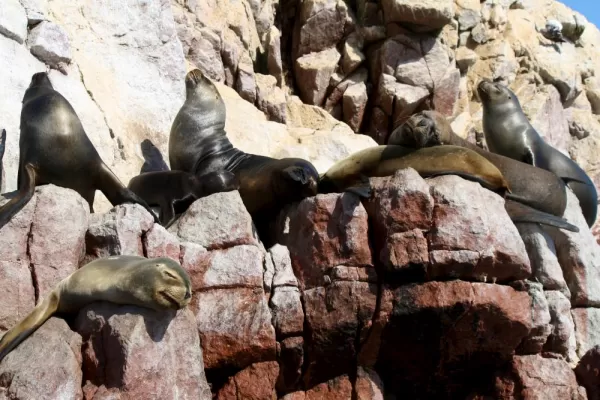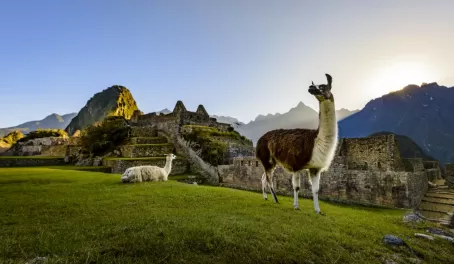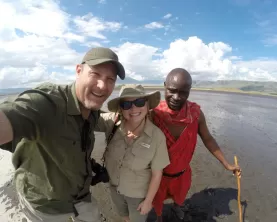
Exploring the Sacred Valley was the plan for the day. Departing from the hotel in Cusco at 8 am, we again rode in a comfortable 11-seat Mercedes van. It was soon evident that tour guide Teddy was quite the opposite from Carlos, meaning a less structured itinerary with later morning departures. About an hour outside of Cusco we stopped at the village of Chinochero to visit the local Sunday Market, colonial church and views of the valley.
CHINOCHERO
The Andean village situated at 12,500 feet featured steep stone steps that climbed through narrow streets lined with brightly colored stucco homes and potted flowers. The main village square contained a massive ancient Inca wall composed of huge rocks with trapezoidal niches overlooking the agricultural terraces. The17th century colonial church made of adobe situated above the square was built on Inca foundations. Faded frescoes covered the exterior walls under the porticoes and mural paintings covered the interior ceiling.
Continuing our drive through the beautiful valley ringed by the snowy peaks of Salcantay, Vilcabamba and the Urubamba mountains ranges in the distance, we continued to see villagers harvesting their crops and shepherds herding their animals. Teddy shared that during the months of December to March, this area receives 65 inches of rain. Community leaders jointly plan the years planting and all villagers work cooperatively. Although unusual, if a family did own a tractor, it was rented out to all villagers. He also stated that only 10% of the land in Peru is available for agriculture. Deciding to take a shortcut to Moray, our driver turned off the paved highway and headed down a narrow, dusty bumpy road. After hitting a deep rut, the van stalled. After several tries and worried exchanged looks, the van did restart and we continued to the site of Moray.
MORAY
This huge depression in the earth caused by erosion and producing intense microclimates was most likely an agricultural development station where Incas tested experimental crops and conditions. Consisting of three main sets of concentric rings that were set deep into the earth, each ring formed sculpted terraces built by layers of gravel, sand, topsoil, and grass. The largest of the three sets had 15 levels with each level being about 10 feet higher than the previous. An elaborate system of irrigation supported each level.
We were stunned by our first view of Moray especially after learning that we would be hiking down into the deep depression. The trail around the upper outer ring followed a gentle decline and while our younger companions did reach the base, Dick and I decided to forego the spiritual energy known to exist at the base, and descended halfway before starting our climb to the top.
Nearing midday, we continued our drive through the Sacred Valley. Descending the valley to the Urubamba River was breathtaking with its steep rolling red hills and snow-capped mountain ranges. Throughout the valley we noticed homes marked by long poles topped by red flags indicating that home-brewed fermented maize beer, or chichi, was for sale inside. A plentiful buffet lunch including chichi was enjoyed in Yucay, a small village along the banks of the river. We decided we preferred Sam Adams to chichi. Continuing our drive, we passed through the larger villages of Urubamba and Yanahuara before reaching our destination of Ollantaytambo.
OLLANTAYTAMBO
This historic town is located at the northwestern end of the Sacred Valley and is the last settlement before reaching Aguas Calientes and Machu Picchu. The snow-capped mountains that embrace the town form a much narrower valley and both sides of the gorge are lined with Inca stone agricultural terraces. The terraced ruins of a massive temple-fortress built by the Incas built into the steep mountainside looms over the town. Ollantaytambo is a grid of streets dating to Inca times and lined with adobe brick walls, blooming bougainvillea, and canals that still carry rushing water down from the mountains.
FORTRESS RUINS
Rising above the valley and town square are dozens of rows of steep stone terraces carved into the hillside. The temple ruins represent one of the Inca Empire's most formidable feats of architecture. After climbing 200 steps to the upper section, you have reached the entry to the temple with its massive doorjam. On the next level are six huge pink granite blocks cut, polished, and fitted perfectly together that form the Temple of the Sun. Across the valley was the quarry that provided the stones for the structure. A great ramp descending from the hilltop ruins was the means by which the Incas transported the massive stones from several miles away.
Upon arrival at the El Sauce Hotel near 3 pm and placing our luggage in our room, Teddy was ready to lead us to the ruins. Viewing the ruins from our hotel was a daunting sight and I entertained thoughts that I would not be reaching the top, or even its midpoint. However, we started our climb and succeeded in reaching the top. In order to avoid most tourists, we walked around the side of the ruins noting the elaborate irrigation system, as well as the storage huts and defensive positions before climbing to the temple areas. After exploring the temple areas, we slowly descended at dusk and returned to the hotel. After a brief rest, Dick and I wandered the dusty quiet streets seeking food and drink. We enjoyed two cervazas at a small quiet bar. Unfortunately, Dick took a slight tumble down the steep, dark and narrow steps. Luckily, he only sustained a slight bruise and cut on his elbow. We crossed the road to the only observed open restaurant where we devoured a wood oven pizza. Returning to our hotel, we set the alarm for 5:30 am and fell asleep.




















